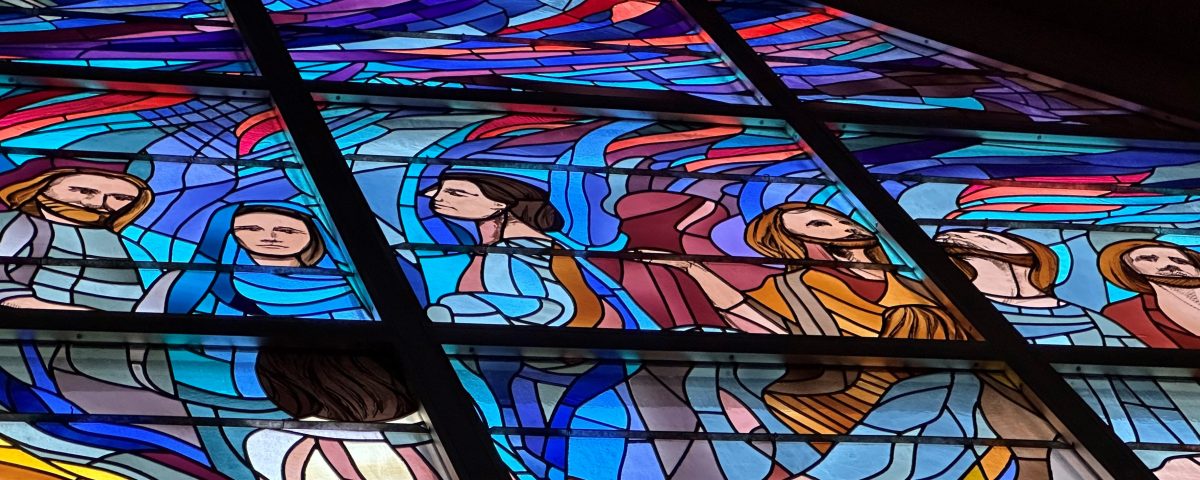I’m sure I’ve told this story before, about an old priest from Cilicia in southern Anatolia. It was centuries ago.
His congregation loved him, but still they complained to the bishop; they wanted him gone. The problem was that the Mass took too long; I don’t know what his preaching was like, but that wasn’t the problem. When the bishop came to investigate, he asked the old priest what the matter was; and the old priest admitted it, that the liturgy did take a long time. But he told the bishop he didn’t know what to do. Because every Sunday, he said, “I remain close by the holy altar; and until I see the Holy Spirit over-shadowing the holy sanctuary, I do not begin.” This explanation seemed to satisfy the bishop, the people too supposedly, although I have my doubts about that.[1] Anyway, I’ve told this story before; you may even remember it. It’s just that I think about it all the time.
Today especially, given it’s the feast of Pentecost. The lesson is simple and good: We should wait upon the Holy Spirit because we know that as Christians we rely on the Holy Spirit. The same Spirit we read was involved in the creation of all things, hovering over the waters; the Spirit manifest in the “cloud” leading the people out of Egypt and the “smoke” encircling Sinai; and the Spirit descending like a dove upon Jesus at his baptism and descending like fire and wind on the disciples at Pentecost, what we celebrate today.[2] This is the Spirit we rely upon and must therefore wait upon—if anything is to come to anything beautiful.
Again, to speak simply: the Spirit makes us what we are—the body of Christ, the Church, friends. Aristotle said once that “no one would choose to live without friends” and that “friendship involves community.”[3] That’s why ethics naturally gives way to politics in Aristotle’s mind. But, of course, he didn’t know Christ. He never came to see that the Church is the realization of the best of what he hoped for—the one body in whom is neither Greek nor Jew, but all are in all—friends in virtue but who by grace have also become saints. That’s what Aristotle was born too early to see—that miracle.
But to be honest, that’s hard to believe sometimes, isn’t it? It’s hard to believe in the Spirit-filled Church. Why is that? Of course, sin—old-fashioned sin. And we could spend all day talking about that. But perhaps in addition to sin, it’s also something more. Maybe it’s a fear of the Holy Spirit. Maybe it’s that we’re afraid to get as close to God as God wants to get close to us.
There’s a famous story from the desert, the desert fathers, about Abba Lot and Abba Joseph. Abba Lot was a good monk but felt something was missing, and so he goes to Abba Joseph and says, “Abba, as far as I can…I fast a little. I pray. I meditate. I live in peace and as far as I can I purify my thoughts. What else am I to do?” Answering him, the story goes: “the old man stood up, stretched his hands towards heaven and his fingers became like ten lamps of fire, and he said to him, ‘If you will, you can become all flame.’”[4]
But that’s a bit scary to consider, isn’t it—letting the Holy Spirit into your life so much you become like fire? We prefer to talk about politics or hot topics in society or the church; we build bureaucracies and call in the lawyers to limit liability. And all that is not wrong; everything must be done in proper order, Paul said.[5] But if all of that necessary stuff is done unanimated by the Holy Spirit, it becomes worthless and an obstacle to God, something he will eventually burn with another sort of fire, less easy to ignore. Which is why being open to the Holy Spirit matters, why we should want it and pray for it.
But I’m not saying rush into it! We must wait on the Holy Spirit, like that old priest; but just don’t let your waiting turn into neglecting.
Friends, what will make the difference in your life and in our life together is not the money you make and the stuff you buy with it; it’s not the politicians you vote for. Rather, it’s the Holy Spirit we allow in our lives and which we allow to sanctify our lives—the Holy Spirit which we allow into our marriages, our parenting, our friendships, our work, our neighborhoods. Only the Holy Spirit can make all that truly meaningful, truly joyful, eternal. And so, I guess the question here is: Have you asked for the Holy Spirit to come into your life? Have you asked God to enter into these specific areas of your life? Not to solve your problems as you think they should be solved, but humbly and as a servant—open to anything, even a cross. It’s hard for Catholics sometimes to pray like that. But that is the only way Pentecost can mean anything in your life, with that sort of prayer—Come Holy Spirit—which you can pray today and which I hope you do, waiting on the Holy Spirit—however long it takes. Amen.
[1] John Moschos, The Spiritual Meadow 27
[2] Exodus 16:10; 19:10; Mark 1:10; Acts 2:1-11
[3] Aristotle, Nicomachean Ethics 1155a; 1159b
[4] The Sayings of the Desert Fathers: The Alphabetical Collection, 88
[5] 1 Corinthians 14:40
© 2024 Rev. Joshua J. Whitfield










